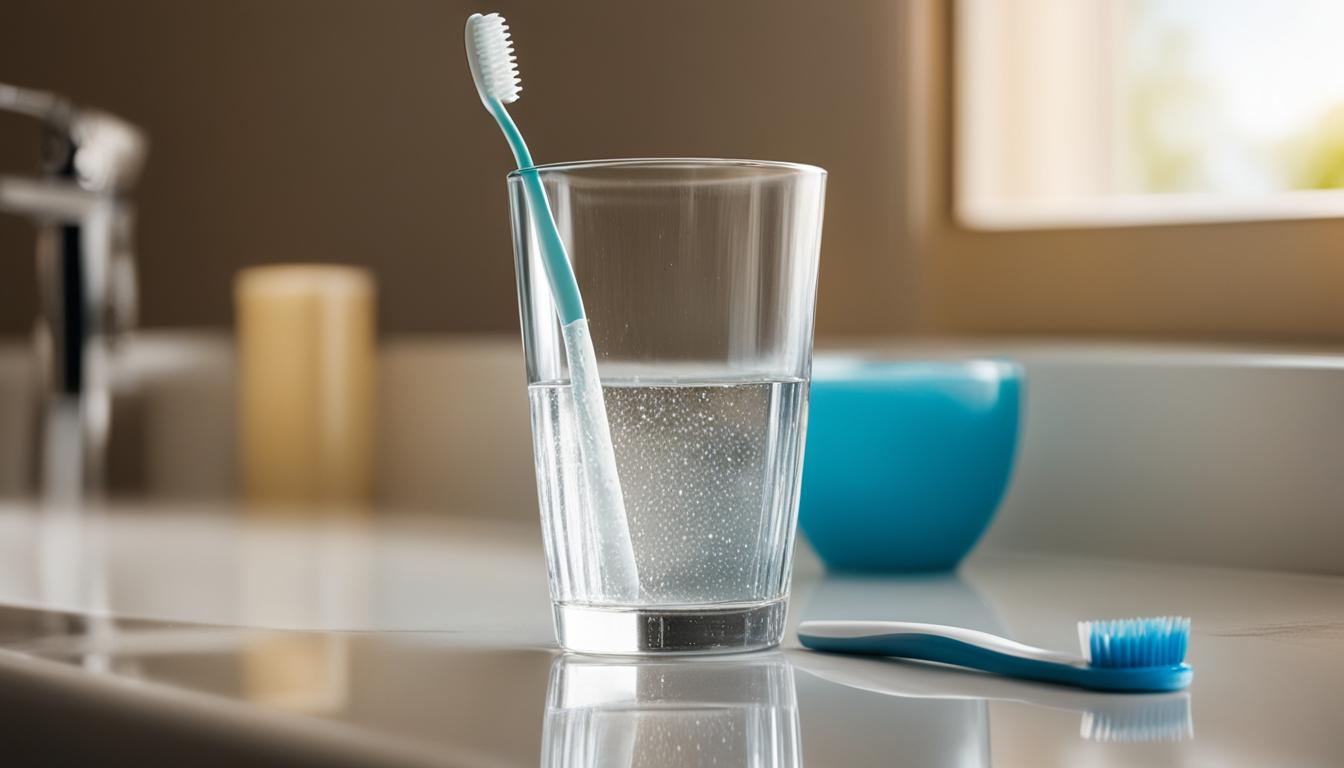Taking care of your dental health is essential for maintaining a beautiful smile. By following these dental health tips, you can prevent future dental issues and keep your teeth and gums healthy.
Dental health is not just about having a perfect smile, but also about maintaining overall oral health. From preventative dental care to maintaining oral health, there are several key practices you can incorporate into your daily routine to ensure a brighter smile. Let’s dive into some essential tips for dental health.
Key Takeaways:
- Follow a daily oral hygiene routine that includes brushing and flossing.
- Cut back on smoking or quit altogether to improve your dental health.
- Choose water over sugary drinks to promote healthy teeth and gums.
- Upgrade your toothbrush to a soft-bristle or electric one for better oral hygiene.
- Treat dental problems immediately to prevent further complications.
Floss Daily for Healthier Teeth and Gums
When it comes to maintaining optimal dental health, flossing daily is essential. While brushing your teeth twice a day is important, it doesn’t fully remove plaque and food particles from between your teeth. This is where flossing comes in. By using dental floss, you can effectively clean those hard-to-reach areas, preventing tooth decay and gum disease.
Flossing is a simple yet highly effective oral hygiene habit. It helps remove plaque, which is a sticky film of bacteria that forms on your teeth and gums. When left unchecked, plaque can lead to cavities, gum inflammation, and even periodontal disease. By incorporating flossing into your daily oral hygiene routine, you can significantly improve the health of your teeth and gums.
When flossing, make sure to use a proper technique. Gently guide the floss between your teeth, moving it back and forth in a C-shape motion. Be careful not to snap the floss against your gums, as this can cause irritation or injury. If you find traditional floss difficult to use, consider using alternative tools such as floss picks or water flossers.
Benefits of Flossing Daily:
- Removes plaque and food particles from between teeth
- Prevents tooth decay and gum disease
- Improves overall oral hygiene
“Flossing daily is crucial for maintaining healthy teeth and gums. It helps remove plaque and prevents tooth decay and gum disease.” – Dr. Jennifer Lopez, DDS
Cut Back on Smoking for a Healthier Smile
Smoking not only affects your overall health but also has detrimental effects on your dental health. It is a well-known fact that smoking stains your teeth, giving them a yellowish appearance that can be difficult to remove. However, the impact of smoking goes beyond cosmetic concerns. Smoking compromises your oral health by increasing the risk of gum disease and contributing to receding gums.
When you smoke, the chemicals in cigarettes irritate your gums and decrease blood flow to the tissues, making them more susceptible to infection. This can result in the development of gum disease, which can cause gum recession, tooth loss, and even bone damage in severe cases. To maintain optimal oral health, it is crucial to cut back on smoking or quit altogether. By doing so, you can significantly improve the health of your gums and reduce the risk of dental problems.
“Smoking not only stains your teeth but also causes receding gums and increases the risk of gum disease.”
It’s important to note that quitting smoking is not only beneficial for your dental health but also for your overall well-being. The long-term effects of smoking extend beyond your oral cavity, affecting your respiratory system, cardiovascular health, and increasing the risk of various cancers. If you’re struggling to quit smoking, consider seeking support from healthcare professionals or support groups to increase your chances of success.
Make a conscious decision to prioritize your dental health by cutting back on smoking. Not only will you notice improvements in the appearance of your smile, but you’ll also reduce the risk of gum disease and maintain healthier teeth and gums. Taking this step towards a smoke-free lifestyle will contribute to your overall well-being and lead to a brighter, healthier smile.
The Impact of Smoking on Dental Health
- Stains teeth, causing a yellowish appearance.
- Increases the risk of gum disease.
- Contributes to receding gums.
- Compromises blood flow to oral tissues.
- Can lead to gum infection and bone damage.
Choose Water Over Sugary Drinks
When it comes to maintaining healthy teeth and gums, your beverage choices play a significant role. Opting for water over sugary drinks like soda can have a positive impact on your dental health. Water is not only calorie-free but also helps prevent the formation of acid that damages tooth enamel. By choosing water, you can quench your thirst without subjecting your teeth to harmful sugars and acids.
Furthermore, water acts as a natural cleanser for your mouth. It washes away sugar and food particles, reducing the risk of cavities and promoting healthy teeth and gums. Regular consumption of water throughout the day can help maintain optimal moisture levels in your mouth, preventing dry mouth and associated dental issues.
To incorporate more water into your daily routine, carry a refillable water bottle with you wherever you go. This will serve as a reminder to stay hydrated and make water your drink of choice. By making this simple switch, you can take a proactive step towards maintaining healthy teeth and gums.

The Benefits of Choosing Water
- Prevents the formation of acid that damages tooth enamel.
- Washes away sugar and food particles, reducing the risk of cavities.
- Helps maintain optimal moisture levels in the mouth, preventing dry mouth.
“Water is the best drink for your teeth and overall health. It is free from sugars and acids that harm tooth enamel, and it helps flush away harmful bacteria. Make water your go-to beverage choice for a smile that stays bright and healthy.”
By consciously choosing water over sugary drinks, you can make a positive impact on your dental health. Incorporate this simple dental health practice into your daily routine and enjoy the benefits it brings for your teeth and gums.
Upgrade Your Toothbrush for Better Oral Health
When it comes to maintaining optimal oral health, choosing the right toothbrush is crucial. Upgrading your toothbrush can make a significant difference in your dental care routine. Consider investing in a soft-bristle toothbrush or an electric toothbrush for improved cleaning and plaque removal.
Using a soft-bristle toothbrush is gentle on your teeth and gums, reducing the risk of enamel erosion and gum irritation. The soft bristles effectively clean your teeth without causing any harm. Remember to replace your toothbrush every three to four months or sooner if the bristles become frayed or worn out.
If you prefer a more advanced option, an electric toothbrush can provide a thorough and efficient cleaning experience. The rotating and oscillating bristles of an electric toothbrush help remove plaque and debris from hard-to-reach areas, promoting better oral hygiene. Some electric toothbrush models even come with built-in timers and pressure sensors to ensure you brush for the recommended two minutes and avoid excessive pressure.
Benefits of Upgrading Your Toothbrush:
- Improved plaque removal
- Gentle on teeth and gums
- Effective cleaning in hard-to-reach areas
- Built-in features for optimal brushing
Using a soft-bristle toothbrush or investing in an electric toothbrush can improve your dental health. Choose a toothbrush that suits your needs and use it twice a day for optimal oral hygiene.
By upgrading your toothbrush and incorporating it into your daily dental care routine, you can enhance your oral health and maintain a brighter smile. Remember to consult with your dentist for personalized recommendations on the best toothbrush option for your specific needs and oral health goals.
Treat Dental Problems Immediately
When it comes to dental health, addressing problems promptly is crucial. Ignoring dental issues can lead to more extensive treatments and complications down the line. If you experience any dental pain or discomfort, it’s essential to seek professional help as soon as possible.
Whether it’s tooth sensitivity, a persistent toothache, or swollen gums, these signs should not be ignored. Dental problems, if left untreated, can worsen over time and cause further damage to your oral health.
“Seeking prompt treatment for dental problems can save you from unnecessary pain and expensive procedures,” says Dr. Emily Brown, a reputable dentist. “Ignoring dental issues can lead to more severe complications and potentially permanent damage.”
Scheduling a consultation with your dentist is the first step towards resolving dental problems. Your dentist will assess the issue, provide a diagnosis, and recommend appropriate treatment options. By addressing dental problems immediately, you can prevent further damage and maintain optimal oral health.
Common Dental Problems and Their Consequences
- Tooth Decay: If left untreated, tooth decay can progress and lead to tooth loss, gum infection, and even bone loss.
- Gum Disease: Untreated gum disease can cause gum recession, tooth mobility, and eventually tooth loss.
- Oral Infections: Infections in the mouth can spread to other areas of the body, impacting overall health.
- Cracked or Broken Teeth: Cracks and fractures in teeth can worsen over time and result in tooth loss if not addressed promptly.
By seeking immediate treatment for dental problems, you can prevent these complications and maintain a healthy smile.
Harness the Power of Fluoride
Fluoride is a mineral that plays a vital role in maintaining oral health. It strengthens tooth enamel and helps prevent tooth decay, making it an essential component of preventative dental care. Incorporating fluoride into your dental care routine can significantly improve your oral health and contribute to maintaining a healthy smile.
Fluoride can be found in various dental products, including toothpaste, mouthwashes, and even tap water. By using fluoride toothpaste and mouthwash, you can ensure that your teeth receive the benefits of this mineral with each brushing and rinsing. Additionally, drinking tap water that contains fluoride can provide an extra layer of protection for your teeth.
Regularly exposing your teeth to fluoride helps to remineralize enamel and repair microscopic areas of decay. It also inhibits the growth of harmful bacteria in the mouth, reducing the risk of cavities and gum disease. With the power of fluoride on your side, you can strengthen your teeth and maintain optimal oral health.
Explore Whitening Products for a Brighter Smile
Everyone desires a bright and dazzling smile that exudes confidence. If you’re looking to enhance the brightness of your smile, consider exploring teeth whitening products. Teeth whitening is a popular dental care technique that can effectively remove stains and discoloration, giving you a radiant smile to be proud of.
Teeth whitening products come in various forms, including whitening toothpaste, whitening strips, and whitening gels. These products contain bleaching agents that penetrate the tooth enamel to break down stains and lighten the color of your teeth. Consult with your dentist to determine which whitening products would be most effective for your specific dental needs.
It’s important to note that while teeth whitening can significantly improve the appearance of your smile, it is not a substitute for good oral hygiene practices. Maintaining a healthy dental care routine, including regular brushing, flossing, and dental check-ups, is essential for optimal oral health. Additionally, it’s important to follow the instructions provided with teeth whitening products carefully to avoid potential sensitivity or damage to your teeth and gums.

Benefits of Teeth Whitening:
- Removes stains and discoloration
- Enhances the brightness and overall appearance of your smile
- Boosts self-confidence and self-esteem
- Provides immediate results
“A bright smile can make a lasting impression and boost your self-confidence.” – Dr. Emily Carter, Dental expert
Tips for a Healthy Smile:
- Brush your teeth twice a day with a fluoride toothpaste.
- Floss daily to remove plaque and food particles between your teeth.
- Avoid smoking and limit your consumption of staining substances like coffee and red wine.
- Maintain a balanced diet rich in fruits and vegetables for strong teeth and gums.
- Schedule regular dental check-ups for professional cleanings and early detection of dental issues.
Embrace a Healthy Diet for Dental Health
When it comes to maintaining dental health, the food you eat plays a crucial role. A balanced diet that includes the right nutrients can strengthen your teeth and gums, helping to prevent dental diseases and promote overall oral health. Here are some oral health tips to help you embrace a healthy diet:
1. Include Fruits and Vegetables:
Fruits and vegetables are packed with essential vitamins and minerals that are beneficial for dental health. Incorporate a variety of colorful fruits and vegetables into your meals to ensure you’re getting a range of nutrients, such as Vitamin C, which helps maintain healthy gums.
2. Choose Calcium-Rich Foods:
Calcium is essential for strong teeth and bones. Include dairy products, such as milk, cheese, and yogurt, in your diet to ensure you’re getting enough calcium. If you’re lactose intolerant or following a plant-based diet, opt for calcium-fortified alternatives, such as almond milk or tofu.
3. Limit Sugary and Acidic Foods:
Sugary and acidic foods can contribute to tooth decay and enamel erosion. Limit your intake of sugary snacks, sodas, and acidic beverages like citrus juices. If you do consume them, rinse your mouth with water afterward to help neutralize the acidity and prevent damage to your teeth.

Remember, a healthy diet is just one component of maintaining dental health. Regular brushing, flossing, and dental check-ups are also essential for a bright smile. By embracing a healthy diet and practicing good oral hygiene habits, you can support healthy teeth and gums for a lifetime.
Brush Twice a Day for Optimal Dental Care
Brushing your teeth twice a day is a fundamental aspect of maintaining good oral hygiene. It helps remove plaque, bacteria, and food particles from the surfaces of your teeth, reducing the risk of dental diseases such as cavities and gum inflammation. To maximize the effectiveness of your brushing routine, follow these dental care tips:
Use the Right Brushing Technique:
- Hold your toothbrush at a 45-degree angle to your gums.
- Gently move the brush in short, circular motions.
- Clean all surfaces of your teeth, including the outer, inner, and chewing surfaces.
- Don’t forget to brush your tongue to remove bacteria and freshen your breath.
Choose the Right Toothbrush and Toothpaste:
Select a toothbrush with soft bristles that can effectively clean your teeth without causing damage to the enamel or gums. Pair it with a fluoride toothpaste to strengthen your tooth enamel and protect against decay. Consider using an electric toothbrush for more thorough cleaning.
Remember, brushing your teeth for a full two minutes each time is important to ensure you reach all areas of your mouth and achieve optimal dental care.
Incorporating brushing into your morning and nighttime routine is essential for maintaining good oral health. Remember to replace your toothbrush every three to four months or sooner if the bristles become frayed. By making brushing a priority, you can keep your smile healthy and shining bright!

Regular Dental Visits for Strong Teeth and Gums
Regular dental check-ups are essential for maintaining strong teeth and gums. By scheduling routine visits with your dentist, you can receive preventative dental care that will help keep your smile healthy and vibrant. During these visits, your dentist will perform a thorough examination of your teeth and gums, checking for any signs of dental issues.
Preventative dental care can catch problems early on and prevent them from worsening. This can save you from experiencing pain and discomfort, as well as potentially expensive dental treatments in the future. Your dentist will also perform professional cleanings to remove plaque and tartar buildup, ensuring that your teeth and gums stay in excellent condition.
Regular dental visits are especially crucial for maintaining oral health because they give your dentist the opportunity to educate you on proper oral hygiene practices. They can provide personalized advice tailored to your specific needs, allowing you to develop a dental care routine that works best for you. By following their recommendations, you can maintain optimal oral health and prevent dental issues from arising.
Benefits of Regular Dental Visits:
- Early detection and prevention of dental issues
- Professional cleanings to remove plaque and tartar
- Education on proper oral hygiene practices
- Personalized advice for maintaining oral health
Regular dental visits are a proactive approach to oral health. They not only keep your teeth and gums strong but also contribute to your overall well-being. Don’t wait for dental problems to arise; schedule your next dental check-up and take control of your oral health today.
Conclusion
By following these dental health tips, you can maintain a healthy smile and ensure optimal oral health care. Incorporating proper oral hygiene habits into your daily routine, such as brushing twice a day and flossing daily, is essential for preventing dental issues such as tooth decay and gum disease. Remember to upgrade your toothbrush to a soft-bristle or electric toothbrush for more effective cleaning.
In addition to maintaining a consistent oral hygiene routine, it’s important to schedule regular dental visits. These check-ups allow for early detection of potential dental problems and provide preventative care to keep your teeth and gums strong. Consult with your dentist for personalized advice on whitening products and fluoride usage.
Embrace a healthy diet rich in fruits and vegetables to support dental health. Opt for water over sugary drinks to prevent tooth enamel damage and cavities. Cutting back on smoking or quitting altogether can significantly improve your dental health and contribute to a brighter smile.
Remember, maintaining a healthy smile requires a combination of proper oral hygiene, regular dental visits, and a healthy lifestyle. Don’t forget to consult with your dentist for personalized advice tailored to your specific dental needs. Start implementing these dental health tips today to enjoy a lifetime of strong teeth and gums.
FAQ
How often should I floss?
It is recommended to floss daily as part of your oral hygiene routine to prevent tooth decay and gum disease.
Does smoking affect dental health?
Yes, smoking stains teeth, causes receding gums, and increases the risk of gum disease. Cutting back or quitting smoking can significantly improve your dental health.
Why is water better for my teeth than sugary drinks?
Water helps prevent the formation of acid that damages tooth enamel and washes away sugar and food particles, reducing the risk of cavities and promoting healthy teeth and gums.
What type of toothbrush should I use?
It is recommended to use a soft-bristle toothbrush or an electric toothbrush for gentle and effective cleaning of your teeth and gums.
Should I address dental pain or discomfort immediately?
Yes, ignoring dental problems can lead to further complications. It is important to schedule a consultation with your dentist as soon as you notice any issues.
How can fluoride benefit my dental health?
Fluoride strengthens tooth enamel and helps prevent tooth decay. It can be found in toothpaste, mouthwashes, and tap water.
Can whitening products enhance the brightness of my smile?
Yes, consulting with your dentist to determine the most effective whitening products for your needs can help enhance the brightness of your smile.
Does a healthy diet contribute to dental health?
Yes, consuming a balanced diet that includes fruits and vegetables rich in vitamins and minerals can strengthen your teeth and help prevent dental diseases.
How often should I brush my teeth?
It is recommended to brush your teeth twice a day to remove plaque and bacteria buildup, reducing the risk of dental diseases.
How often should I see my dentist?
Regular dental check-ups, ideally every six months, are crucial for maintaining strong teeth and gums. They allow for early detection and preventative care.


